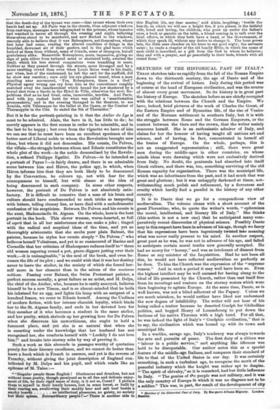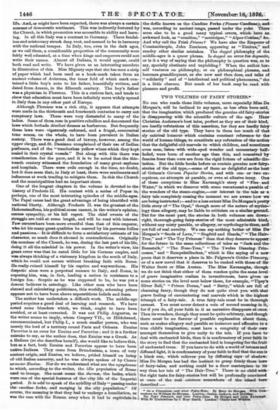SKETCHES OF THE HISTORICAL PAST OF ITALY.* THESE sketches take
us rapidly from the fall of the Roman Empire down to the thirteenth century, the age of Dante and of the beginning of the revival of letters. Italy during this period was of course at the head of European civilisation, and was the source of almost every great movement. So its history is in great part the history of Europe. The sketches before us are chiefly occupied with the relations between the Church and the Empire. We have, indeed, brief pictures of the work of Charles the Great, of the Eastern Empire and of Byzantine life, of the rise of Venice and of the Norman settlement in southern Italy, but it is with the struggle between Rome and the German Emperors, or the contest between the tiara and the crown, that the writer mainly concerns herself. She is an enthusiastic admirer of Italy, and claims for her the honour of having taught all nations art and science, and of having, in fact, concentrated in herself all the brains of Europe. On the whole, perhaps, this is not an exaggerated representation ; still, there were great men during the middle-ages in other countries, on whose minds ideas were dawning which were not exclusively derived from Italy. No doubt, the peninsula had absorbed into itself Greek culture, and there was, too, something surviving of the old Roman capacity for organisation. There was the municipal life, which was an inheritance from the past, and it had much that was great and glorious ; but it was unhappily darkened at times, not- withstanding much polish and refinement, by a fierceness and cruelty which hardly find a parallel in the history of any other country.
It is to Dante that we go for a compendious view of medirevalism. The volume closes with a short account of the great Florentine, who, to quote the writer's words, "epitomises the moral, intellectual, and literary life of Italy." She thinks (this notion is not a new one) that he anticipated many com- paratively recent discoveries of physical science. Possibly Dante may in this respect have been in advance of his age, though we fancy that his expressions have been ingeniously twisted tato meaning what was never really present to his mind. In another respect, great poet as he was, he was not in advance of his age, and failed to anticipate certain moral truths now generally accepted. He had no mercy for "heresy," and was as intolerant of dissent from Rome as any minister of the Inquisition. Had he not been all this, he would not have reflected medimvalism so perfectly as he does. To him the Church was the expression of the "supreme reason." And in such a period it may well have been so. Even the highest intellect may be well excused for having clung to the ideal of life presented by the Church, rather than cast itself free from its moorings and venture on the stormy waters which were then beginning to agitate Europe. At the same time, Dante, as is well known, was not a blind adherent of the Papacy. Unless we are much mistaken, he would neither have liked nor understood the new dogma of infallibility. The writer will not hear of his being called a traitor because he deserted Guelph for Ghibelline politics, and begged Henry of Luxembourg to put down the factions of his native Florence with a high band. For all that, he was indeed the light of Italy's " Guelphic civilisation," that is to say, the civilisation which was bound up with its town and municipal life.
In a warlike, savage age, Italy's tendency was always towards the arts and pursuits of peace. The first duty of a citizen was "labour in a public service," and anything like idleness was held to be disreputable. Our author notes this as a special feature of the middle-age Italians, and compares their standard of life to that of the United States in our day. It was certainly something, in such a turbulent age, to recognise the merit of the peaceful industry which the knight was rather apt to despise. "The spirit of chivalry," so it is remarked, had but little influence in Italy. "The genius of the people was not military, and it was the only country of Europe in which it was no disgrace not to be a soldier." This was, in part, the result of the development of city • Sketches of the Historical Past of Italy. By Margaret Albans Mignaty. London Bentley.
life. And, as might have been expected, there was always a certain amount of democratic sentiment. This was indirectly fostered by- the Church, in which promotion was accessible to ability and learn- ing. In all this Italy was a contrast to Germany. There feudal- ism and aristocracy struck deep root, and seemed to be in harmony with the national temper. In Italy, too, even in the dark ages, as we call them, a considerable proportion of the community were fairly well educated, at a time when kings and emperors could not write their names. Almost all Italians, it would appear, could both read and write. We have given us an interesting anecdote
in illustration of this. Miss Mignaty says that she has seen a strip
of paper which had been used as a book-mark taken from an ancient volume of Avicenna, the inner fold of which mark con- tained a little boy's note to his father, beautifully written, and dated from Arezzo, in the fifteenth century. The boy's father was a physician in Florence. This is a curious fact, and tends to show that education must have been infinitely more widely spread in Italy than in any other part of Europe.
Although Florence was a rich city, it appears that attempts were made in the thirteenth and fourteenth centuries to carry out sumptuary laws. These were very distasteful to many of the ladies. Some of them rose in positive rebellion and denounced the
laws which forbade dlcollete dresses as barbarous. But frequently these laws were vigorously enforced, and a frugal, economical
tone seems, on the whole, to have been prevalent in Italian
society. There was a good deal of luxury, however, among the upper clergy, and St. Damian° complained of their use of Indian perfumes, and of the "numberless yellow wines which they kept sealed in their crystal vessels." But along with this there was consideration for the poor, and it is to be noted that the thir- teenth century witnessed the foundation of many great asylums and hospitals. There were evils enough in the time, no doubt,. but it does seem that, in Italy at least, there were sentiments and influences at work tending to mitigate them. In this the Church and the municipalities had an important share.
One of the longest chapters in the volume is devoted to the history of Frederio IL His contest with a series of Popes is, perhaps, one of the most interesting episodes of the middle-ages.
The Papal cause had the great advantage of being identified with national liberty. Although Frederic H. was the greatest of the Hohenstauffens, his political cause cannot, in the writer's opinion, arouse sympathy, or his fall regret. The chief events of the struggle are told at some length, and will be read with interest.
Few oareershave beemmore eventful than that of this emperor, who let his many greatiqualities be marred by his perverse follies and passions. It is difficult to form a satisfactory estimate of his character, so much does it abound in contradictions. Originally the nominee of the Church, he was, during the last part of his life, doing it aRthe mischief in his power. In the writer's view, his
great error was that he cared little for his German empire, and
wan always thinking of a visionary kingdom in the south of Italy, which he could not secure without breaking faith with Rome.
He really ruined himself by his caprice and waywardness. His despotic aims were a perpetual menace to Italy, and Rome, in ooposing him, was, in fact, leading a nation in resistance to a foreign foe. Sceptic as he was supposed to be, he was yet a devout believer in astrology. Like other men who have been shrewd and calculating politicians, this worldly, scheming prince appears not to have been above superstitious beliefs and fears.
The author has undertaken a difficult work. The middle-age period requires a good deal of learning and research. We have noted some blunders which, we think, ought to have been avoided, or at least corrected. It was not Philip Augustus, as the writer seems to imply, whom Gregory VII., or Hildebrand,
excommunicated, but Philip I., a much smaller person, who was merely the lord of a territory round Paris and Orleans. Ennius Pacuvius is an error for Ennius and Pacuvius; and it is a further mistake to say, as the author does, that Ennius was a Greek. As a Hellene (so she describes herself), she would like to believe this,
but as a fact, both Ennius and Pacuvius appear to have been native Italians. They came from Brundusium, a town of very ancient origin, and Ennius, we believe, prided himself on being
of old Italian ancestry, and he was always spoken of by Cicero asmoster Ennius. Nor do we understand what are the nympheums in. which, according to the writer, the idle population of Rome used to lounge. She must mean the thermos, the baths, which were one of the special features of the city life of the Imperial period. It is odd to speak of the nobility of Italy" passing under the caudine forks, and merging in the city population." Of course, the meaning is that they had to undergo a humiliation, as was the case with the Roman army when it had to capitulate in the defile known as the Caudine Forks (Fauces Caudinae), and was, according to ancient usage, passed under the yoke. There seem also to be a good many typical errors, which have an awkward look, as " comitiae," "municipae," " Alpae Cottiae," 8cc. And why call the Frisii Prisons? We have also the Emperor of Constantinople, John Zemisces, appearing as "Zimices," and sundry other similar mistakes. The dogged philosophy of the middle-ages is a queer phrase. Is dogged an error for dogmatic, or is it a way of saying that the philosophy in question was, so to say, specially obstinate and unyielding ? When the author her- self ventures on philosophy, or on philosophical phrases, and becomes grandiloquent, as she now and then does, and talks of " solidarity " and of "intellectual and political phenomena," she is a little obscure. But much of her book may be read with plesaure and profit.







































 Previous page
Previous page